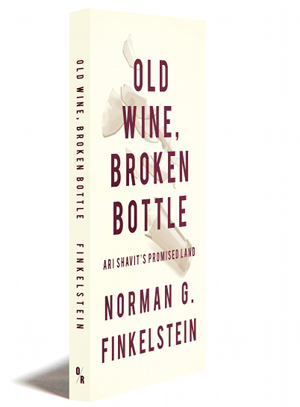
Attempts by the likes of Ari Shavit to defend Israeli policy in Palestine wear ever thinner, as shown by Norman Finkelstein’s robust critique in Old Wine, Broken Bottle, finds Rohan Bundell

Norman G Finkelstein, Old Wine, Broken Bottle: Ari Shavit’s Promised Land (O/R Books 2014), 97pp.
Israel’s criminal siege of Gaza has been undermining support for its policies towards the Palestinians, not just in general international opinion, but among Jewish-Americans in particular, even before the latest attacks. Attempts to shore up traditional sources of support, especially in the USA, are therefore an essential part of defending the Zionist project. Ari Shavit’s recent book, My Promised Land (2013) is a very notable example of this attempt, and so a comprehensive demolition is very welcome.
Old Wine, Broken Bottle is the latest effort from master guff-buster Norman G. Finkelstein, and provides a thorough critique of Ari Shavit’s account of the Zionist foundations, and current predicament, of the modern Israeli state. Shavit, currently a journalist for the liberal Israeli daily Haaretz, released his book in late 2013 to acclaim from various corners of the Jewish political establishment for having rejuvenated the Zionist message. Finkelstein tackles and debunks with decisiveness the suggestion that this text might reverse the growing estrangement of the more liberal minded American-Jewish population from their cousins in Israel. Furthermore, he exposes Shavit’s many glaring inaccuracies and omissions, shatters with decisive force his moral justifications for the tragedies involved in the creation of the Zionist heartland, and lays bare as delusional the notion that this is a balanced account devoid of propagandising.
Finkelstein has previous form in overturning widely held misconceptions. In the book Knowing Too Much, he dealt at length with the decline of the American-Jewish romance with Israel. In Old Wine, Broken Bottle, he maintains his trademark combative and no-bullshit approach. Finkelstein’s production line of counterarguments is relentless, and helped by his tendency to write long and multifaceted sentences, neatly layering a clarifying phrase here and a contextual titbit there. His style makes you feel like you are engaged in conversation with him, rather than being lectured to from afar. It is refreshingly un-academic, making for a read that is both accessible to non-experts and not patronising to those already knowledgeable on the subject.
A lengthy portion of My Promised Land is devoted to justifying the initial ethnic cleansing of Palestinians by Zionist settlers, on the basis of the ‘Palestine was empty’ hypothesis. Finkelstein addresses this in depth, refuting Shavit’s argument convincingly. Since, as he shows, this debate is not new, this is another reason why Shavit’s book merely ‘recycles too many shattered myths’ for it to be seriously convincing for an American-Jewish audience (p.15). In uncloaking Shavit’s claims to impartiality (Shavit: ‘I am no judge, I am an observer’, p.22), Finkelstein argues that the observational stance takes place through ‘the judgmental lens of an unreconstructed European imperialist’ (p.22). Finkelstein goes on to detail a whole series of biases in Shavit’s juxtapositions between the original Israeli settlers and Palestinian natives, such as depictions of the natives as lazy and backwards, versus the enterprising and righteous settlers (p.23). He is immensely effective in stripping down bogus claims to the bare nonsense they are.
Frequently, he makes reference to the similarities between the original Zionist settlers of Palestine and the American settlers’ conquest of the West over the indigenous American population. He also revels in using My Promised Land’s reasoning to show that Shavit possesses ideas of biological superiority, excuses ethnic cleansing when committed by the upper classes, and either falsifies, or is ignorant of, a range of historical episodes. He casts Shavit as someone whose thinking is riddled with clichés and displays an ugly hubris.
Although methodical and measured for most of his critique, he is not afraid of more direct ridicule when deserved. Commenting on Shavit’s response to some of the more ludicrous displays of Zionist rhetoric (which features repeatedly in the guise of ‘eminent and respectable’ sources in My Promised Land), Finkelstein quips: ‘At junctures of such profundity a Polish proverb hastens to mind, “From empty to vacuum”’ (p.62). Likewise, he does not err when firing his wit at the Israeli government, which many of Shavit’s arguments both implicitly and explicitly defend. He mocks their self-regard as that of ‘the already overburdened shoulders of the Light Unto the Nations’, in reference to the ‘failure of the UN’ to sanction Iran more harshly when they were accused of developing nuclear-weapons capabilities in the late 2000s. His sarcasm is not only a delight to read but has the serious purpose of emphasising the level to which My Promised Land sinks. It complements rather than carries his reasoning and is a balance many could not maintain with such dignity: ‘If, to mangle Emerson, a preposterous inconsistency is the hallmark of great minds, then Shavit must be a veritable genius’ (p.63).
Finkelstein at one point claims that it ‘is child’s play not just to poke holes in but also turn on their head all of Shavit’s propositions’ (p.54), but perhaps he does not appreciate the ease with which those yearning for a redemption of the Zionist cause can be swept away by the propaganda of writers like Shavit. Old Wine, Broken Bottle not only blocks such a redemption, but is also a vital tool in the development of a counter-narrative for the ongoing Israeli-Palestinian crisis to that predominantly portrayed in the media. The Jewish-American community’s growing estrangement from Israel may, indeed, not be reversed by My Promised Land. However, with the recent conflict in Gaza yielding over 1,900 dead at the time of writing, what seems more important to focus on is finding the spark that will move greater numbers in Jewish communities, in the US or internationally, to oppose loudly the occupation and current slaughter. As a hugely persuasive challenge to Zionist ideology, which for many underpins their tolerance of the Israeli government’s actions, Finkelstein’s latest critique might just provide that spark.

